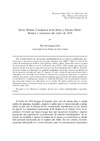Please use this identifier to cite or link to this item:
https://accedacris.ulpgc.es/jspui/handle/10553/44331
| Title: | Silvia Mistral, Constancia de la Mora and Dolores Martí: Stories and memoirs of the exile, 1939 | Authors: | Domínguez Prats, Pilar | UNESCO Clasification: | 55 Historia | Keywords: | Memoria Exiliadas Guerra Civil Realtos autobiográficos Ego-documentos |
Issue Date: | 2012 | Publisher: | 0034-8341 | Journal: | Revista de Indias | Abstract: | This article discusses the autobiographical accounts of three Republican women from the first generation of Republican exiles, born between 1900 and 1910. The stories are those of Constancia de la Mora, Silvia Mistral and Dolores Martí, all written just following the Spanish Civil War, between 1939 and 1940, although for two of the authors this was the first stage of exile that finally took them on to Mexico. These accounts are examined within the framework of the socio-political context in which the authors lived during the first three decades of the twentieth century. The stories mix the personal and individual with the collective memory. The women harbour very contrary political views - communist and anarchist - within the Republican cause but the fact that they are women with a common plight helps to overcome these differences. The political nature of these narratives also provides a common theme, which forms a collective testimony in the Republican exile period. Este artículo analiza las narraciones autobiográficas de tres mujeres republicanas, pertenecientes a la primera generación del exilio (nacidas entre 1900 y 1910). Se trata de los relatos de Constancia de la Mora, Silvia Mistral y Dolores Martí. Todos ellos tienen en común la circunstancia de haberse escrito en Francia entre 1939 y 1940, aunque para dos de las autoras esta fue la primera etapa del exilio que las llevó definitivamente a México. El análisis de los relatos se enmarca en el contexto sociopolítico en el que vivieron sus autoras en las tres primeras décadas del siglo XX. Aparece en ellos el fruto de una memoria personal e individual, pero insertada en la memoria colectiva de su grupo de referencia, el colectivo exiliado. Las autoras representan tendencias políticas opuestas dentro del bando republicano: el comunismo y el anarquismo, aunque su condición femenina y las circunstancias comunes que atraviesan matizan esas diferencias en sus relatos. El carácter político de sus escritos, elaborados como el testimonio colectivo de la diáspora republicana, es también un elemento común a todos ellos. | URI: | https://accedacris.ulpgc.es/handle/10553/44331 | ISSN: | 0034-8341 | DOI: | 10.3989/revindias.2012.26 | Source: | Revista de Indias[ISSN 0034-8341],v. 72, p. 799-824 |
| Appears in Collections: | Reseña |
SCOPUSTM
Citations
1
checked on Jun 8, 2025
WEB OF SCIENCETM
Citations
1
checked on Jan 18, 2026
Page view(s)
250
checked on Jan 15, 2026
Download(s)
142
checked on Jan 15, 2026
Google ScholarTM
Check
Altmetric
Share
Export metadata
Items in accedaCRIS are protected by copyright, with all rights reserved, unless otherwise indicated.
